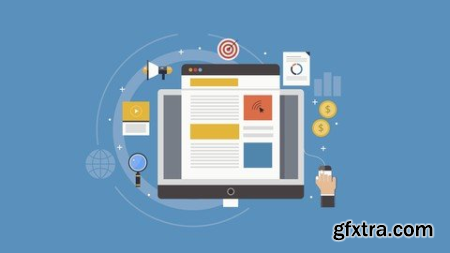
Last updated 4/2017MP4 | Video: h264, 1280x720 | Audio: AAC, 44.1 KHzLanguage: English | Size: 333.97 MB | Duration: 2h 37m
More than 50 videos to help you get started with the Jupyter Notebook
What you'll learn
Install and run the Jupyter Notebook system on your machine
Implement programming languages such as R, Python, Julia, and javascript with the Jupyter Notebook
Use interactive widgets to manipulate and visualize data in real
Share your Notebook with colleagues
Invite your colleagues to work with you in the same Notebook
Perform scientific application development by leveraging Big Data tools such as Spark
Requirements
Modern Windows or Macintosh machine with Internet access
Basic programming knowledge of Python, R, javascript, Julia, Scala, and Spark would be beneficial
Description
Are you looking forward to write, execute, and comment your live code and formulae all under one roof? Or do you want an application that will let you forget your worries in scientific application development? If yes, then this Learning Path will surely help you out by provide all that you need to know to work with the Jupyter Notebook — a console-based approach to interactive computing!
Packt’s Video Learning Paths are a series of individual video products put together in a logical and stepwise manner such that each video builds on the skills learned in the video before it.
The Jupyter Notebook is an open-source web application that supports more than 40 programming languages including those popular in data science such as Python, R, Julia, and Scala. This Learning Path is a one-stop solution for all you want to know about the Jupyter Notebook. It will teach you everything you need to know to perform scientific computation with ease.
This Learning Path starts with a brief introduction to Jupyter Notebook and its installation in different environments. Next, you will see how to integrate the Jupyter system with different programming languages such as R, Python, javascript, and Julia. Moving ahead, you will master interactive widgets, namespaces, and working with Jupyter in the multiuser mode. You will also see how to share your Notebook with colleagues. Finally, you will learn to access Big Data using Jupyter.
By the end of the Learning Path, you will be able to write code, compute mathematical formulae, create graphics, and view the output, all in a single document and web browser, using the Jupyter Notebook.
About the Author
For this course, we have combined the best works of this esteemed author
Dan Toomey has been developing applications for over 20 years. He has worked in a variety of industries and companies in roles from the sole contributor to VP/CTO level. For the last 10 years or so, he has been contracting to companies in the eastern Massachusetts area. Dan has been contracting under Dan Toomey Software Corporation again as a contractor developer in the area.
Overview
Section 1: Jupyter Notebook for All – Part I
Lecture 1 The Course Overview
Lecture 2 First Look at Jupyter
Lecture 3 Installing Jupyter on Windows
Lecture 4 Installing Jupyter on Mac
Lecture 5 Notebook Structure, Workflow, andBasic Operations
Lecture 6 Security and Configuration Operations in Jupyter
Lecture 7 Basic Python in Jupyter
Lecture 8 Python Data Access in Jupyter
Lecture 9 Python pandas in Jupyter
Lecture 10 Python Graphics in Jupyter
Lecture 11 Python Random Numbers in Jupyter
Lecture 12 Adding R Scripting to Your Installation
Lecture 13 Basic R in Jupyter
Lecture 14 R Dataset Access and Visualization in Jupyter
Lecture 15 R Cluster Analysis and Forecasting
Lecture 16 Adding Julia Scripting to Your Installation
Lecture 17 Basic Julia in Jupyter
Lecture 18 Julia Limitations and Standard Capabilities
Lecture 19 Julia Visualizations in Jupyter
Lecture 20 Julia Vega Plotting and Parallel Processing
Lecture 21 Julia Control Flow, Regular Expressions, and Unit Testing
Lecture 22 Adding javascript Scripting to Your Installation
Lecture 23 javascript Hello World Jupyter Notebook
Lecture 24 Basic javascript in Jupyter
Lecture 25 Node.js stats-analysis Package and JSON Handling
Lecture 26 Node.js plotly Package
Lecture 27 Node.js Asynchronous Threads
Lecture 28 Node.js decision-tree Package
Section 2: Jupyter Notebook for All – Part II
Lecture 29 The Course Overview
Lecture 30 Installing Widgets and Widget Basics
Lecture 31 Interact Widget
Lecture 32 Interactive Widget
Lecture 33 Widgets
Lecture 34 Widget Properties
Lecture 35 Sharing Notebooks on a Notebook
Lecture 36 Sharing Notebooks on a Web Server and Docker
Lecture 37 Sharing Notebooks on a Public Server
Lecture 38 Converting Notebooks
Lecture 39 Sample Interactive Notebook
Lecture 40 JupyterHub
Lecture 41 JupyterHub – Operation
Lecture 42 Docker and Its Installation
Lecture 43 Building Your JupyterImage for Docker
Lecture 44 Installing the Scala Kernel
Lecture 45 Scala Data Access in Jupyter
Lecture 46 Scala Array Operations
Lecture 47 Scala Random Numbers in Jupyter
Lecture 48 Scala Closures andHigher Order Definitions
Lecture 49 Scala Pattern Matching andCase Classes
Lecture 50 Scala Immutability
Lecture 51 Scala Collections and Named Arguments
Lecture 52 Scala Traits
Lecture 53 Apache Spark
Lecture 54 Our First Spark Script and Word Count
Lecture 55 Estimate Pi andLog File Examination
Lecture 56 Spark Ps andText File Analysis
Lecture 57 Spark – Evaluating History Data
This Learning Path caters to all developers, students, and educators who want to execute code, see the output, and comment all in the same document, the browser,Data science professionals will also find this Learning Path very useful in perfog technical and scientific computing in a graphical, agile manner
HomePage:
Top Rated News
- Sean Archer
- John Gress Photography
- Motion Science
- AwTeaches
- Learn Squared
- PhotoWhoa
- Houdini-Course
- Photigy
- August Dering Photography
- StudioGuti
- Creatoom
- Creature Art Teacher
- Creator Foundry
- Patreon Collections
- Udemy - Turkce
- BigFilms
- Jerry Ghionis
- ACIDBITE
- BigMediumSmall
- Boom Library
- Globe Plants
- Unleashed Education
- The School of Photography
- Visual Education
- LeartesStudios - Cosmos
- Fxphd
- All Veer Fancy Collection!
- All OJO Images
- All ZZVe Vectors




 Categories
Categories







